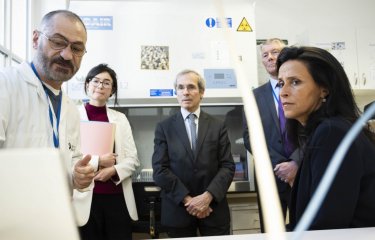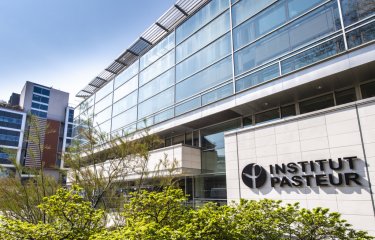The Nobel Prize in Medicine 2008 has been awarded to Professors Françoise Barré-Sinoussi and Luc Montagnier for their discovery of the human immunodeficiency (AIDS) virus in 1983 at the Institut Pasteur, and to Prof. Harald zur Hausen for his discovery of the human papillomavirus, which is responsible for cervical cancer.
Press release
Paris, october 6, 2008
“Twenty five years after the isolation of the human immunodeficiency virus, this prize recognizes the outstanding work of its two recipients and of their clinical and research colleagues. It is also a fantastic encouragement for the entire scientific community studying HIV/AIDS. Despite huge progress in detection and treatment, the fight against this dreadful disease must continue until we get it fully under control”, declared Alice Dautry, President of the Institut Pasteur.
According to Jean-François Delfraissy, President of the National Agency for AIDS and Viral Hepatitis Research (ANRS): “This award comes at just the right time because many people erroneously beginning to think that the AIDS issue has been solved from North to South. This prize is going to encourage youngsters to tackle numerous unsolved challenges, such as the development of a vaccine, virus monitoring and new therapeutic treatments”.
Françoise Barré-Sinoussi
Françoise Barré-Sinoussi is Emeritus Professor at the Institut Pasteur and Emeritus Director of Research at the CNRS. She heads the Retroviral Infection Control Unit of the Institut Pasteur, and she is also President of the Scientific Committee of the National Agency for AIDS and Viral Hepatitis Research (ANRS) and head of the ANRS site in South East Asia. Françoise Barré-Sinoussi has established numerous collaborations with countries deeply affected by the HIV/AIDS epidemic, in particular through the Institut Pasteur International Network. She has published 216 articles in international scientific journals, has presented more than 250 papers at international conferences and has 17 patents. Her team of around 20 scientists is currently working on how the virus is transmitted from mother to child, on innate mechanisms that control HIV infection and on HIV-related simian viruses that infect monkeys..
Françoise Barré-Sinoussi has been awarded many prizes (including the Sovac Prize, the Körber Foundation Prize for the promotion of European Science, the French Academy of Science Prize, the King Faisal International Prize and the International AIDS Society Prize). She has been Officer in the Order of the Légion d’Honneur since 2006.
André Syrota, President of the Health and Medical Research National Institute (INSERM), congratulated Prof. Barré-Sinoussi for her outstanding career and her scientific and human commitment to the fight against AIDS. “The numerous collaborations she has created in developing countries and the permanent link she has forged between basic research and clinic research have made her an unparalleled ambassador of French biomedical research”.
Luc Montagnier
Luc Montagnier, 76, is Professor at the Institut Pasteur, where he was director of the Viral Oncology Unit from 1972 to 2000. He is also Emeritus Director of Research at the French National Centre for Scientific Research (CNRS) and member of the French Academies of Sciences and Medicine.
Prof. Montangnier is President of the World Foundation for AIDS Research and Prevention, which he founded in 1983 together with Federico Mayor, former General Director of the United Nations Educational, Scientific and Cultural Organization (UNESCO). This Foundation created the Bioclinical Research Integrated Centre of Abidjan (CIRBA) in 1996 and the “Chantal Biya” International Reference and Research Center for the prevention and care of HIV/AIDS in Cameroon. Luc Montagnier contributed to the creation of many biotech companies in the United States and in France. He has been awarded the CNRS Silver Medal, the Rosen Prize of Cancerology, the Lasker Award, the Gairdner Award, the Gallien Prize, the Jeantet Prize, the Prize of Japan and the King Faisal International Prize. He is also Commander in the Order of the Legion d’Honneur and Commander in the National Order of Merit.
According to Arnold Migus, President of the CNRS, “The 2008 Nobel Prize for Medicine has been awarded to three Europeans: a German scientist and two French scientists. This award to Françoise Barré-Sinoussi and Luc Montagnier is an honor to the Institut Pasteur, the CNRS and INSERM, who managed to mobilize their best talents on a major health scientific issue. By awarding Luc Montagnier, Emeritus Director at the CNRS, its prize, the Nobel Committee singles out an outstanding researcher and co-discover of the AIDS virus, who was able to spread quality French research far beyond our borders”.
The discovery of HIV-1 at the Institut Pasteur
The adventure of isolating an unknown virus that was to become responsible for a fearful pandemic, started at the Institut Pasteur in December 1982. The Viral Oncology Unit of the Institut Pasteur, which specialized in studying relationships between retrovirus and cancers, started its work on HIV when it was asked for assistance by clinicians from the AP-HP. Luc Montagnier led the team and the major contribution to studying the new virus was made by Françoise Barré-Sinoussi. In January 1983, the team started work on the first lymph node biopsy of a patient suffering from “general lymphadenopathy”, the “pre AIDS” stage in the disease (before the appearance of a deep immunodeficiency). In May 1983, the Institut Pasteur team published the first description of the HIV, then named “Lymphadenopathy Associated Virus” or LAV, in the journal Science. At the same time, a team of American scientists led by Robert Gallo was also trying to identify the virus. A few months after the French discovery, a group of molecular biologists from the Institut Pasteur determined the genome sequence of HIV, permitting the first diagnostic tests to be developed. Later, detailed investigation of the viral replication cycle led to the development of many new classes of antiviral drugs that were to be used to treat AIDS patients.
______________________
* Isolation of a T-Lymphotropic Retrovirus from a Patient at Risk for Acquired Immune Deficiency Syndrome ( AIDS), Science , 220, 868-871 (1983)
F. Barré-Sinoussi1, J.C. Chermann1, F. Rey1, M.T. Nugeyre1, S. Chamaret1, J. Gruest1, C. Dauguet1, C. Axler-Blin1, F. Vézinet-Brun2, C. Rouzioux2, W. Rozenbaum3, L. Montagnier1.
1- Département de Virologie, Institut Pasteur
2- Laboratoire Central-Virologie, Hôpital Claude Bernard
3- Département de Santé publique et Médecine tropicale, Hôpital La Pitié-Salpétrière
Press contacts
Institut Pasteur
Corinne Jamma or Nadine Peyrolo
01 45 68 81 46 - 06 07 86 56 82 - presse@pasteur.fr
Inserm
Séverine Ciancia
01 44 23 60 86 - presse@tolbiac-inserm.fr
CNRS
Priscilla Dacher
01 44 96 46 06 - priscilla.dacher@cnrs-dir.fr
ANRS
Marie-Christine Simon
01 53 94 60 30 - marie-christine.simon@anrs.fr





